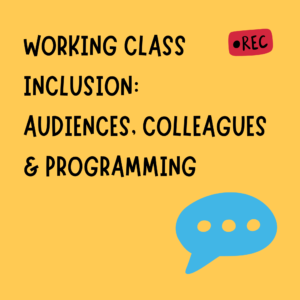What this toolkit is
This toolkit is, foremostly, a practical guide for improving the experiences of POC (people of colour) audiences, staff and filmmakers – and other intersections including gender, sexuality, disability, income and class. Whilst the harm and discrimination POC face in the arts both as workers and audiences is firmly rooted within institutional and systemic injustice, preventing immediate harm is the key priority – and that begins with immediate, though not as radical, reform. This goes beyond representation, and towards creating a space built for all people rather than for primarily white audiences. Whether your cinema is in a rural part of the UK, or in a densely populated city, ethnically diverse audiences are there and it is your cinema’s role to serve them.
The second function of this toolkit is to create lasting change for future generations, and sustain your organisation in a meaningful way (one which is framed around serving communities and not merely securing funding). To do this, you must play your role in preventing harm on an institutional and systemic level. In addition to immediately actionable tools, this toolkit will encourage inner, reflective and dialogue-based work towards undoing systemic injustice. This work will be longer term, and may at times feel personal, however confronting these uncomfortable spaces from positions of privilege is fundamental to creating wider change. Treat the provocations as actionable on a personal level within your roles and workplaces, because the results will be structural change that will not allow harm to exist within your organisations.
Who this is for
It is important that this toolkit is offered to all staff members in your cinema or film organisation; from trustees and managers to programmers and front-of-house staff. Whilst some will find responsibility placed on them to action certain aspects, others will be empowered by the conversations around equity this toolkit may enable. We implore you to talk widely within your organisation about the implications of this toolkit, in an environment in which hierarchies are cut away. Pay all staff equally to feed into this dialogue, and you will see what emerges on this new ground.
Whilst this toolkit has been written in the locale of South Wales, it is aimed towards independent cinemas, festivals, film-based organisations and digital film spaces across the UK – responding to regional differences in audiences, access to funding, rurality and lived experience.
What can be achieved with this toolkit
We hope that once this toolkit is worked through, you will come away with an understanding that increasing diversity and access is not a means of sustaining your organisation, but of sustaining and resourcing the communities that cinema serves. This document further hopes to provide an opportunity to reflect on your organisation’s intentions, and how to realign those back to serving all audiences and filmmakers.
Immediate implications will be a reimagining and dismantling of old ways of working, and implementing new models of equity within your organisation and for those who enter your space (whether physical or digital). This is necessary work as a cultural space. It is always possible if there is the will to change, from staff make-up to programming practices, organisational hierarchies to an equalisation of pay; but if there isn’t a will to change, there must be a divestment of power and transference of funding to the communities your organisation is failing to serve. This toolkit will help you confront these different potentials for change.
This is difficult work because it calls for challenging your positionality, your personal and emotional responses, your attachment to a workplace, your unconscious and conscious biases, your own stability, your lived experiences, and the harmful structures you may benefit from. Then, it calls for a letting go. Inequity is not any one person’s fault but it is our collective responsibility to understand and undo it. And finally, it calls for a real commitment to doing the work.
Download the toolkit.
Download the plain text version.
___
In April 2021, Sadia spoke with BoxOffice Podcast about the toolkit. Listen here and check at the link for a full transcript of the interview.








